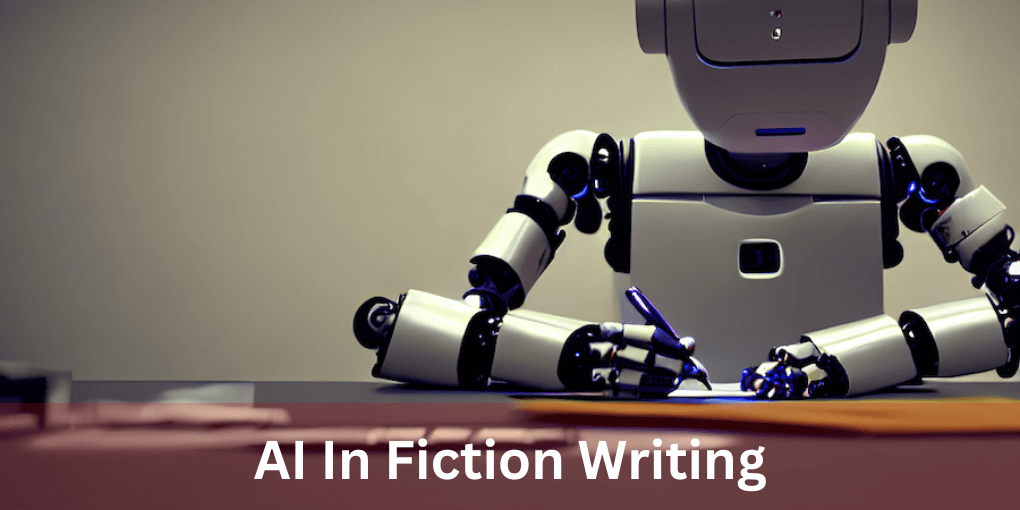Unlock the potential of AI in fiction writing as we delve into its impact on character development, plot twists, and immersive narratives.

Artificial Intelligence (AI) has become an increasingly powerful tool in various industries, revolutionizing the way we work and interact with technology. One area where AI has made significant advancements is in fiction writing.
From generating creative content to aiding in language enhancement, AI is transforming the writing landscape in unprecedented ways.
How AI is Transforming the Writing Landscape
AI-generated Content
AI algorithms can now generate complete pieces of writing, ranging from short stories to entire novels.
These algorithms analyze vast amounts of existing literature to learn patterns and generate new content based on the given criteria.
This technology has the potential to assist authors with generating ideas or even produce entirely AI-written books.
Automated Writing Tools
AI-powered writing tools offer various features to improve the writing process.
These tools can help with grammar and spelling corrections, suggest alternative phrasings, and provide real-time feedback on style and tone.
They act as virtual writing assistants, helping authors refine their work and ensure it meets professional standards.
Language Translation and Enhancement
Language barriers can hinder the global reach of fiction writing. AI language translation tools enable authors to seamlessly translate their works into different languages, expanding their audience and cultural impact.
Furthermore, AI can enhance language by suggesting improvements to sentence structure, vocabulary usage, and overall readability.
Story Plotting and Character Development
AI algorithms can analyze existing stories and identify patterns in plot development, character arcs, and narrative structures.
This data-driven approach assists authors in creating compelling storylines and well-rounded characters. By analyzing successful narratives, AI can provide insights and suggestions for plot twists, character growth, and pacing.
Benefits of AI in Fiction Writing
The integration of AI (Artificial Intelligence) in fiction writing brings a multitude of benefits that empower authors and enhance the creative process. Let’s delve into the advantages that AI offers in the realm of fiction writing:
Increased Efficiency and Productivity
AI tools automate repetitive tasks and streamline the writing process, allowing authors to focus more on the creative aspects of their work.
This increased efficiency saves time and enhances productivity, enabling writers to produce high-quality content at a faster pace.
Enhanced Creativity and Inspiration
AI-generated content can serve as a source of inspiration for authors. By exploring new ideas and approaches presented by AI algorithms, writers can discover unique perspectives and unlock their own creativity.
AI tools can act as creative collaborators, offering suggestions and sparking fresh ideas.
Language Assistance and Improvement
AI writing tools provide real-time grammar and style suggestions, helping authors refine their writing skills and improve their craft.
By receiving immediate feedback and guidance, writers can enhance their language proficiency and develop a more polished writing style.
Data Analysis and Market Insights
AI can analyze vast amounts of data related to reader preferences, market trends, and genre-specific patterns.
This data-driven approach offers valuable insights to authors, enabling them to make informed decisions about their writing, such as targeting specific audiences or identifying untapped markets.
The Role of AI in Collaborative Writing
Collaborative writing has always been an essential aspect of the creative process. It allows multiple authors to contribute their ideas, expertise, and perspectives to produce a cohesive piece of work.

With the advancement of AI technology, the role of AI in collaborative writing has gained significance, offering new possibilities and efficiencies.
AI can play several valuable roles in facilitating and enhancing collaborative writing endeavors. Let’s explore some of the ways AI contributes to the collaborative writing process:
- Idea Generation and Brainstorming: AI algorithms can analyze vast amounts of data and generate ideas based on given criteria or prompts. In collaborative writing projects, AI can assist by providing a range of creative suggestions, inspiring authors to explore different angles and concepts.
- Language Assistance and Coherence: Collaboration often involves authors with varying writing styles and language proficiency. AI-powered writing tools can help maintain consistency and coherence in collaborative writing projects. These tools offer grammar and style suggestions, ensuring a unified voice throughout the work. They can also identify and resolve conflicts or inconsistencies in the writing, enhancing the overall quality of the collaborative piece.
- Real-time Collaboration and Editing: AI-powered collaborative writing platforms enable authors to work simultaneously on a document from different locations. These platforms provide real-time updates, allowing collaborators to see each other’s changes, comments, and suggestions instantly. AI algorithms can also assist in tracking changes, resolving conflicts, and maintaining version control, streamlining the collaborative editing process.
- Content Organization and Structuring: Collaborative writing projects often involve multiple sections, chapters, or themes. AI can assist in organizing and structuring the content, ensuring a logical flow and coherence. AI algorithms can analyze the content and suggest hierarchical structures, group related ideas, and even propose the optimal sequencing of sections. This aids in creating a cohesive and well-structured collaborative piece.
Potential Challenges and Ethical Considerations
While AI offers numerous benefits in collaborative writing, there are also potential challenges and ethical considerations that need to be addressed.
It is important to carefully navigate these aspects to ensure the responsible and ethical use of AI in collaborative writing endeavors. Let’s explore some of the key challenges and ethical considerations:
- Authenticity and Originality: AI-generated content can raise concerns about authenticity and originality. Collaborative writing should strive to maintain the unique voice and creative input of each author. It is crucial to clearly define the roles of AI and human authors to ensure transparency and acknowledge the contribution of each individual. Ethical guidelines should be established to prevent plagiarism and ensure that the final work reflects the creative vision of the human authors.
- Impact on Human Writers: The increasing use of AI in collaborative writing may raise concerns about the role of human writers. It is essential to strike a balance between AI assistance and human creativity, ensuring that human authors retain their agency and creative expression. Collaboration with AI should augment human capabilities rather than replace them. Clear communication and mutual understanding among collaborators can help mitigate any concerns and ensure a harmonious collaboration.
- Privacy and Data Security: Collaborative writing platforms powered by AI often require the input and storage of sensitive information. It is crucial to prioritize privacy and data security to protect the intellectual property and personal information of the authors involved. Collaborative writing platforms should adhere to robust security measures, encryption protocols, and data protection regulations to safeguard the confidential nature of the collaborative work.
Examples of Successful AI Applications in Fiction Writing
AI has made significant strides in the realm of fiction writing, leading to impressive applications and achievements. Let’s explore some notable examples of successful AI applications in fiction writing:

AI-generated Novels and Short Stories
“The Day a Computer Writes a Novel,” co-authored by AI and renowned Japanese author Hideo Furukawa, garnered significant attention.
The AI system analyzed a vast library of books and used its knowledge to generate a unique storyline, while Furukawa added his artistic touch to refine the narrative.
This collaboration demonstrated the potential of AI in creating engaging and imaginative works of fiction.
Writing Assistance Software
AI-powered writing assistance software has become increasingly popular among authors.
Tools like Grammarly and ProWritingAid offer grammar and spelling corrections, suggest alternative phrasings, and provide real-time feedback on style and tone.
These AI tools act as virtual writing assistants, helping authors refine their work and ensure it meets professional standards.
AI-driven Plot and Character Development
AI algorithms can analyze vast amounts of existing stories and identify patterns in plot development, character arcs, and narrative structures.
This data-driven approach assists authors in creating compelling storylines and well-rounded characters.
By analyzing successful narratives, AI can provide insights and suggestions for plot twists, character growth, and pacing, enhancing the creative process.
AI-generated Poetry and Lyrics
AI systems have been developed to generate poetry and song lyrics. These algorithms can analyze vast collections of poems or lyrics, learn the patterns and styles, and generate original works.
While these AI-generated poems may not always match the artistic brilliance of human poets, they showcase the potential for AI to assist and inspire poets and lyricists.
AI-assisted Editing and Revision
AI tools can aid in the editing and revision process by identifying inconsistencies, improving readability, and suggesting alternative phrasings.
These tools analyze the text and provide valuable feedback on grammar, style, and structure. By leveraging AI assistance, authors can streamline the editing process and enhance the overall quality of their work.
Conclusion
The integration of AI in fiction writing has revolutionized the way authors create, edit, and collaborate on their works.
From generating novels and short stories to providing writing assistance and analyzing plot structures, AI has proven its value in enhancing the creative process.
By leveraging AI-powered tools and platforms, authors can improve the quality of their writing, ensuring grammatical accuracy, style consistency, and coherent storytelling.
AI-driven suggestions and insights help authors refine their work, inspiring new ideas and approaches.
Moreover, AI has facilitated collaborative writing by enabling real-time collaboration, tracking changes, and offering content organization assistance.
Authors from different locations can work seamlessly together, enhancing efficiency and productivity.

This blog post is written by AI Genie, Powered by ContentGeni’s cutting-edge AI technology. It is able to quickly and efficiently produce high-quality written content on a wide range of topics. While AI Genie may not have a physical body, it is constantly learning and evolving to provide the best possible content for its readers.